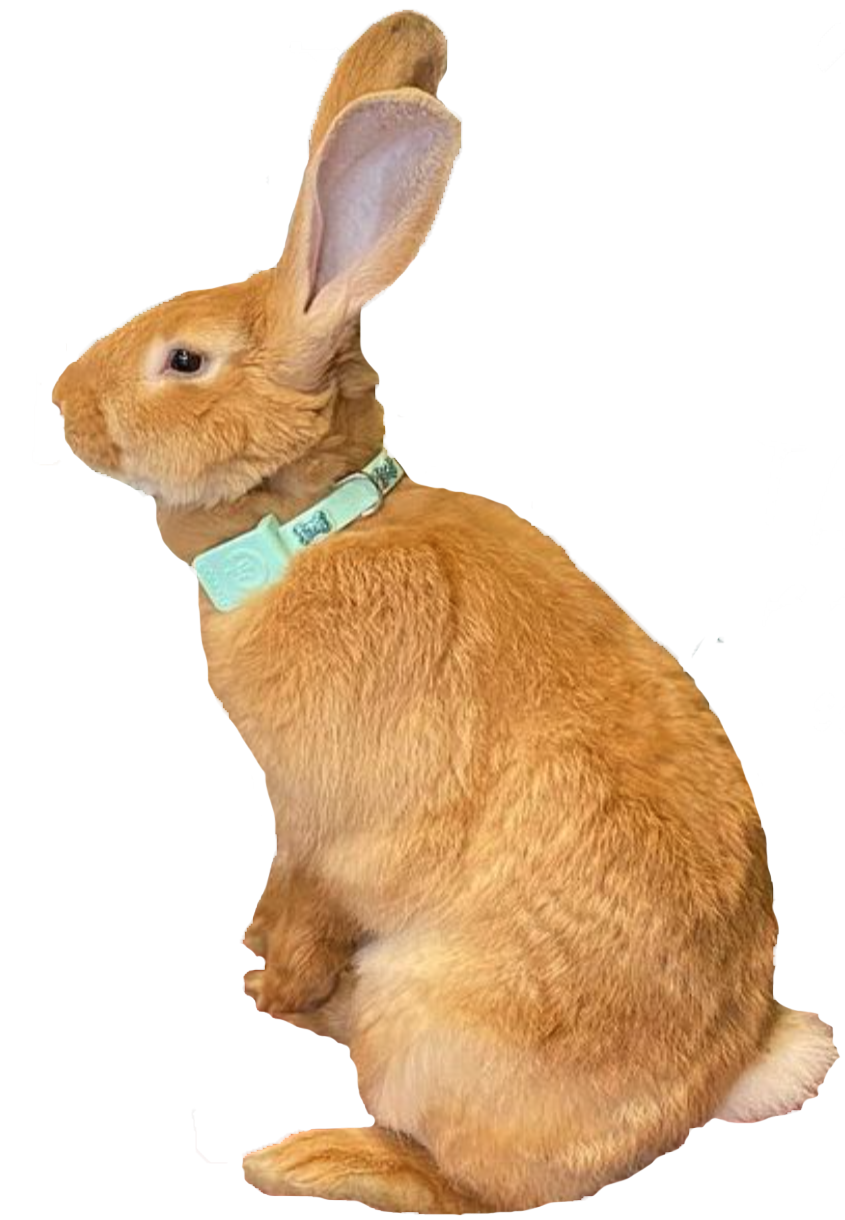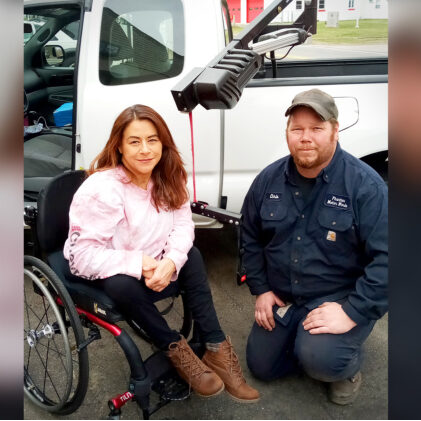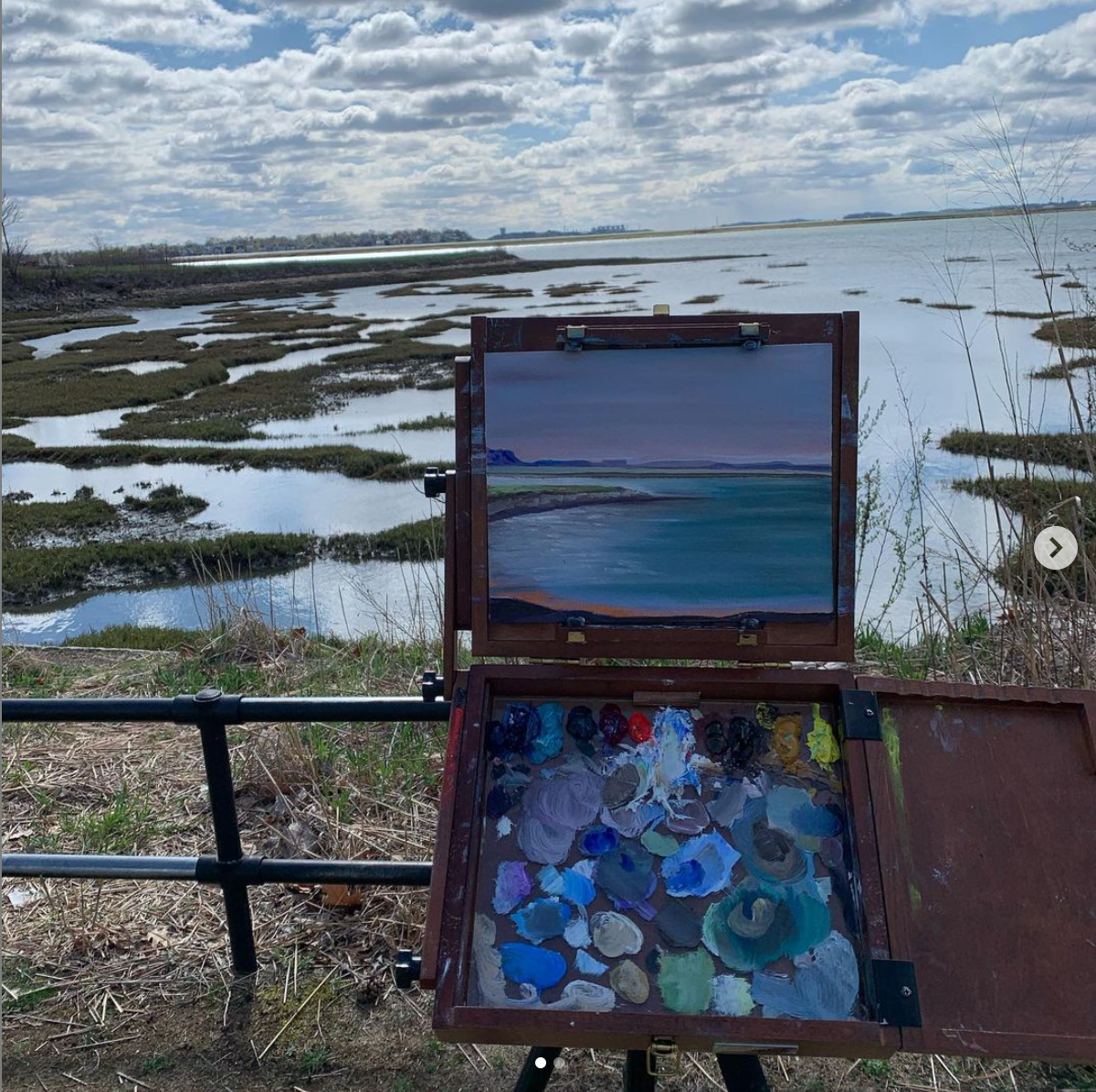Category: Uncategorized
- Rabbit attends baseball game; the world rejoices
- Because of the COVID-19 pandemic, professional baseball teams have been scrambling to figure out safe ways to bring fans back into the stands: baseball mitts, peanuts, Cracker Jacks, bunnies, and all. Yes. Bunnies. On Thursday, April 22nd, the baseball world was pleasantly shocked to see a large pet bunny in the stands during the San Francisco Giants’ home game at Oracle Park against the Miami Marlins. Kei Kato brought her fiancé, Josh Row, and her therapy bunny, Alex the Great to the ballpark, and the furry fan was greeted with immense joy.
Giants’ spokeswoman Staci Slaughter tells ESPN that Alex was the first bunny to attend a Giants game in Oracle Park’s 22-year history. Many speculate whether or not the bunny was a good luck charm for the club, after it pulled off a 3-0 victory with Alex in attendance. Throughout the game, broadcast cameras would cut between the action on the field and the bunny in the stands. Towards the end of the game, a Marlins’ media relations staff member set out to bring Alex team merchandise. He may have been disappointed to find that Alex was already donning the home team’s garb; the bunny had a dark bow tie with orange crabs on it, representing the Giants’ team colors. Alex the Great is just over four months old. Kato, 32, got Alex three months ago to help her manage various stress and anxiety related to the pandemic. After losing her brewery restaurant, “K-OZ”, Kato was in need of additional support systems. She tells ESPN that "I lost it all because of COVID, so I've been really stressed a lot.” Having Alex join the family has made a dark time brighter. In the same ESPN article, Kato has endless kind words to say about her furry friend: “We actually bring him everywhere. He brings joy to everybody. He brings joy to us."View this post on Instagram
- A Wheely Great Mechanic
- In Rhode Island, a mechanic and a woman became friendly after he helped her put air into her wheelchair tires. The friends met in North Smithfield, Rhode Island when Lisa Abrants was doing exercise laps near Christian Barber’s place of work, Phantom Motor Works. After Abrants’ truck’s wheelchair lift started malfunctioning, she asked Barber for some help. Abrants had tried to contact the company who constructed the lift, but they were unresponsive. Further, she had yet to find a mechanic that she could trust. Although he had never done this type of repair before, Barber made it his mission to figure out how to fix it. He dedicated weeks to fixing it. He stated, “If a human put it together, a human can fix it.” Despite it being near impossible to find the right parts, after six weeks Barber completed the repairs. When asked about his dedication, Barber stated, “My wife is disabled, so I understand the struggle.” Barber charged Abrants a negligible fee, likely one that only covered the cost of parts. Barber said, “It’s the way I was brought up. One hand washes the other.” While Barber saw his actions as the right thing to do, Abrants, and others, see it as going above and beyond the general call of a mechanic. When asked about Barber’s actions, Abrants stated, “It just shows that there are good people in the world.” It is a reminder to all of us that you really can have a big impact on the lives of others, without fully knowing it.
- 7 Year Old Raises Thousands For Her Brain Surgery Through Lemonade Stand
- Since she suffered a Grand Mal seizure this past January, Alabama 7-year-old Liza Scott has been selling homemade lemonade by the cup to raise money for her upcoming brain surgeries. What began as an adorable plan became a lucrative enterprise—the young Liza has raised tens of thousands of dollars from her lemonade stand. When Liza suffered a deeply serious seizure on January 30th, Birmingham doctors discovered that she had three rare brain malformations in her brain. If untreated, these issues could cause future seizures, strokes, or brain hemorrhages, according to the fundraising web page set up by Liza’s mom, Elizabeth. Elizabeth is a single mother who raises both Liza and a 3-year-old son. She also runs Savage’s bakery in Homewood (AL). With two kids and a store to manage—all during the COVID-19 pandemic, which has not been kind to small businesses like Savage’s—brain surgery costs were a brutal blow for Elizabeth’s family. She writes on Liza’s fundraising page that “the next year [of surgeries] will require a tremendous commitment of our family, our business, and anyone who is willing to join in this journey with us.” Despite her young age, Liza recognized the greater implications that the logistics of her surgery would have on her family’s stability and well-being. So, she decided to be proactive and relieve some of the financial pressure herself. And so, Liza’s famous lemonade stand was born. Elizabeth was all for Liza’s drive to help her family, so she built her daughter a personalized lemonade stand outside Savage’s Bakery.
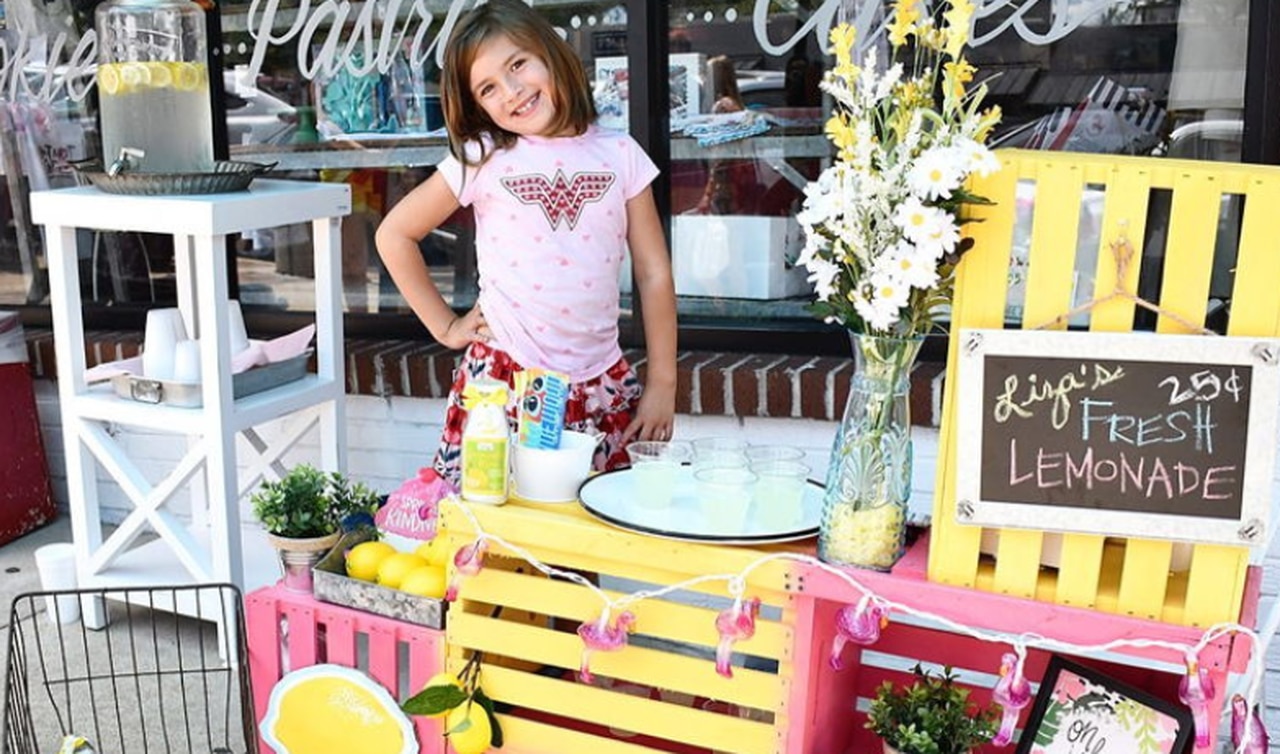 This behavior is not a surprise to those who know Liza well. Elizabeth tells Fox News that "Liza has always shown the initiative to step up and take part in helping with things around the house or at the bakery even when it’s not expected or asked."
The 7-year-old sold her refreshing beverages for 25 cents per cup. Her concoctions seemed to get Alabama residents hooked; Liza’s stand had raised an estimated $15,000-$20,000 by the beginning of March. “Selling lemonade (and other special treats) is one of [Liza’s] favorite things to do,” Elizabeth writes on the fundraising site. “So much so I built her a Lemonade Stand...sell she does, even giving it away for free just because she wants everyone to enjoy.”
The family has raised nearly $400,000 online for the surgeries and accompanying travel expenses to hospitals in Boston. After a successful first surgery, Liza’s family is preparing for a second one in May, which involves removing part of her skull. In the meantime, Liza and her mother are working to put together care packages for families that also are enduring difficult medical issues and hospital travel.
The popular cliché “When life gives you lemons, make lemonade” has never been more applicable.
This behavior is not a surprise to those who know Liza well. Elizabeth tells Fox News that "Liza has always shown the initiative to step up and take part in helping with things around the house or at the bakery even when it’s not expected or asked."
The 7-year-old sold her refreshing beverages for 25 cents per cup. Her concoctions seemed to get Alabama residents hooked; Liza’s stand had raised an estimated $15,000-$20,000 by the beginning of March. “Selling lemonade (and other special treats) is one of [Liza’s] favorite things to do,” Elizabeth writes on the fundraising site. “So much so I built her a Lemonade Stand...sell she does, even giving it away for free just because she wants everyone to enjoy.”
The family has raised nearly $400,000 online for the surgeries and accompanying travel expenses to hospitals in Boston. After a successful first surgery, Liza’s family is preparing for a second one in May, which involves removing part of her skull. In the meantime, Liza and her mother are working to put together care packages for families that also are enduring difficult medical issues and hospital travel.
The popular cliché “When life gives you lemons, make lemonade” has never been more applicable.
- Fraternity brothers pay off house cook’s mortgage
- Jessie Hamilton worked as a cook at a Louisiana State University fraternity over three decades ago. When the fraternity brothers heard Hamilton was still working two jobs at age 74, they decided it was their time to give back to the woman that was like a mother to them all those years ago. Roughly 90 members of Phi Gamma Delta, or Fiji, chipped in $51,765 to pay off Hamilton’s mortgage, with each brother donating around $600 to $1,000 on average. About a dozen members of the fraternity surprised Hamilton with the money in Baker, Louisiana on April 3, just before her 74th birthday.
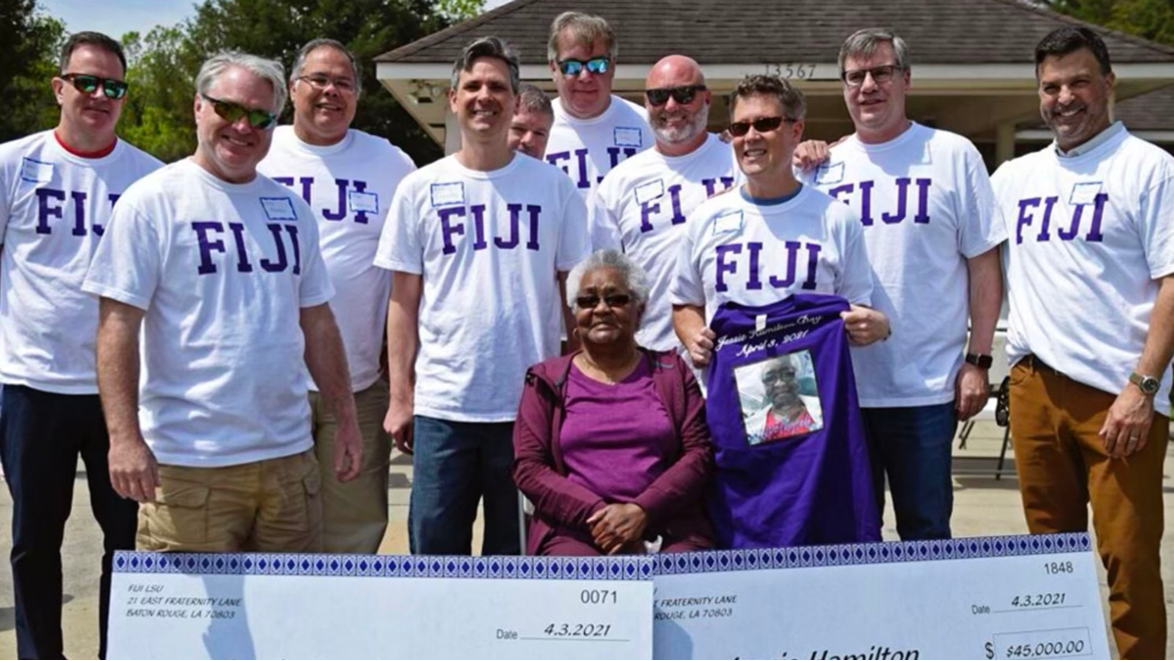 The fraternity brothers had special T-shirts made for the occasion. They played a “Let’s Make a Deal” style game with her, but all of the doors were winning ones for Hamilton.
Behind one door was the T-shirts with “Jessie Hamilton Day” on them and a catered lunch from a local seafood restaurant. The next door had an oversized check for $6,675, and the final one was the big check for $45,000.
“That shows how they all felt about her,” said Andrew Fusaiotti, who was a member of the fraternity in the late 1980s. “Jessie is one of these people that shows up to work and always has a smile on her face, eager to please and never complains.”
Hamilton spent 14 years working as a cook for the fraternity from 1982-1986, but she also helped students with rides to the grocery store and doctor’s appointments. She was 60 when she purchased her first home in 2006 with a 30-year mortgage.
She originally planned to continue working until the home was paid off. Now, she plans to retire and take a trip to Hawaii.
“This has been a blessing to me,” Hamilton said. “I have been worrying about how I was going to pay my house off. I am grateful for what God has done and has led them to do for me.”
The fraternity brothers had special T-shirts made for the occasion. They played a “Let’s Make a Deal” style game with her, but all of the doors were winning ones for Hamilton.
Behind one door was the T-shirts with “Jessie Hamilton Day” on them and a catered lunch from a local seafood restaurant. The next door had an oversized check for $6,675, and the final one was the big check for $45,000.
“That shows how they all felt about her,” said Andrew Fusaiotti, who was a member of the fraternity in the late 1980s. “Jessie is one of these people that shows up to work and always has a smile on her face, eager to please and never complains.”
Hamilton spent 14 years working as a cook for the fraternity from 1982-1986, but she also helped students with rides to the grocery store and doctor’s appointments. She was 60 when she purchased her first home in 2006 with a 30-year mortgage.
She originally planned to continue working until the home was paid off. Now, she plans to retire and take a trip to Hawaii.
“This has been a blessing to me,” Hamilton said. “I have been worrying about how I was going to pay my house off. I am grateful for what God has done and has led them to do for me.”
- ‘Scapes for Strangers
- Jack Garcia is using his talents to bring joy to the people of Boston. Garcia is a nursing student at Massachusetts College of Pharmacy and Health Sciences. He recently picked up the hobby of oil painting, and in the last 5 months, he got really good at it. Now, he is using his talent and creating a scavenger hunt of sorts for his twitter followers. He stated, “I just thought it would be really nice if you’re walking down the street and you see this scene you really like and you look down and there was an oil painting of it, that would be really cool right?” He embraced this idea and decided to leave his creations around the city for the taking. He lets people know where to find the paintings on his Twitter @JakeScapes. When a specific visual sparks his creativity, he sets up and paints it. He then tries to leave it somewhere in the vicinity. So far, he has left four of his oil paintings in South Boston, and says he is just beginning. “I’m doing something I really love. At the end of the day that’s why I’m doing this. It’s very exciting to see where this will all go,” said Garcia. He wants to inspire others to start painting as well. “We’ve all been inside and a beautiful thing to do is to just go outside and just enjoy the sounds and the sights and the smells and just paint what you see,” he said. “I think that’s really nice and I think more people need to do it.” As a nursing student, Garcia has a desire to help others. He is genuinely a kind and compassionate individual. He is not leaving his paintings for money or recognition. He emphasized, “I just want to try to be an efficient human being that makes people happy. I want to help people...And if it brings them some joy, I think that’s really sweet.”
- Meet the St. Louis Zoo’s most trusted assistents
- When the St. Louis Zoo needed a hand, they knew who to call: “The Turtle-Whisperer”. This is the cryptic moniker for John Rucker, the man who has trained seven Boykin spaniel dogs to sniff out turtles. The zoo summoned Rucker and his canine team to their WildCare Park conservation area to track down three-toed box turtles, who are currently being threatened by an outbreak of Ranavirus—a disease which has an 80% fatality rate for this specific group of reptiles. Once a turtle is found, the dog brings it to a scientist who applies a tracking advice to the reptile, which will remain on their shell for a year as part of a continued research initiative. Ultimately, tracking has been implemented to better understand the turtles’ movement through their environment and their health amidst the spread of the dangerous Ranavirus. Rucker’s dogs are trained to be “soft-mouthed”, gently picking up the turtles and bringing them to officials at WildCare Park. Thankfully, the virus cannot be spread to dogs, so their direct contact with the turtles does not put their health in jeopardy. In a Good New Network Article, St. Louis Institute for Conservation Medicine’s Jamie Palmer expresses gratitude for the dog’s turtle-finding prowess. “Every year we do annual health assessments of our turtles at our field sites. We spread out in a line and just walk the woods, eyes to the ground—and we don’t do it well because they’re good at hiding,” he says. “There’s so much error in humans, and we’ve spent hundreds of hours. But dogs, their noses are better than ours…and we’ve seen them find a lot of turtles.” Because the turtles leave behind a very faint scent of smell in the ground as they move, the dogs’ acute olfactory skills and proximity to the ground make them a prime candidate for being effective “turtle-whisperers.” So, with the dogs’ help, scientists are able to find their turtles safely in a much more efficient manner—which is especially necessary as these turtles encounter a severe health scare. Rucker’s turtles have also brought their talents to neighboring Iowa and Illinois. As Missouri’s official reptile, the three-toed box turtles are of particular interest to the state, making the threat of the Ranavirus pathogen all the more significant.
- Stranger surprises 4-year-old twins with puppy after finding wishlist tied to balloon over 500 miles away
- As a way to brighten the darker days of the pandemic, Leticia Flores-Gonzalez allowed her four-year-old twin daughters, Luna and Gianella, to make more arts and crafts. The twins released a set of red balloons from their yard in Liberal, Kansas back in December as their way of sending Christmas wish lists to Santa. The balloons made it all the way to Alvin Bamburg of Shreveport, Louisiana as he was hunting. This discovery led to the twins receiving everything on their Christimas list. The twins’ mother, 37, said she is still stunned by strangers’ generosity. The idea for the wish list balloons came from family relatives in Mexico. “I took a picture of their letter because I never thought we’d see it again,” said Flores-Gonzalez. “It was super windy and cold. I didn’t expect it to go any further than Liberal. Two days before Christmas, Bamburg was deer hunting in Grand Cane, Louisiana when he spotted the red balloon. He found a note attached to the balloon that said a little girl from Kansas had been a good girl all year and wanted a Disney “Frozen” doll and a puppy. Bamburg shared his findings to Facebook in a post that garnered over 220 shares. He located the little girl within 24 hours. Flores-Gonzalez was unsure about how to respond. “I felt bad. I didn’t want gifts. I didn’t do it for that purpose,” she said. “My sister and family told me it’s a once-in-a-lifetime thing. Finally, after we spoke for a while, they convinced me to go ahead and get ahold of Alvin.” Bamburg shipped several boxes of gifts to the family, and said he just had to get the puppy. Flores-Gonzalez and Bamburg met in Oklahoma City to surprise the girls with their new furry friend, Max. The new family friends communicate almost daily and have plans to meet up again in May. “There’s so much depression, so much sadness going on. Some people are losing their families because of this pandemic,” Flores-Gonzalez said. “This gives us hope there’s so many wonderful people still on this Earth.”
- Amazon (and others) Help Save the Amazon
- A new private-public endeavour is underway to save the rainforest. Norway, Britain, and the United States’ governments are partnering with major private companies to finance the protection of the world’s tropical forests. Such big-name companies include such as Amazon, Nestle, Unilever, Airbnb, Boston Consulting Group, McKinsey, and Bayer. At the US-convened Leaders Summit on climate, the extensive group announced their “Lowering Emissions by Accelerating Forest” (LEAF) finance coalition. They intend to raise $1 billion in initial financing. Their plan is simple: governments and companies participating in the LEAF coalition will pay countries with tropical and subtropical forest for emissions reductions. These countries will have to cut their emissions under the supervision of a third-party environmental agency. The immediate goal is to reduce deforestation, and the ultimate goal is to end it completely. This initiative is increasingly important, as the pace of deforestation is picking up. 2020 saw a 12% increase in deforestation compared to last year, losing approximately 10 million hectares of tropical rainforest- about the size of Switzerland. According to US Special Presidential Envoy for Climate John Kerry, “The LEAF coalition is a groundbreaking example of the scale and type of collaboration that is needed to fight the climate crisis and achieve net-zero emissions globally by 2050. Bringing together the government and private-sector resources is a necessary step in supporting the large-scale efforts that must be mobilized to halt deforestation and begin to restore tropical and subtropical forests.” This pioneering model is extremely innovative in its local-level involvement. Manish Bapna, the Interim President and CEO of World Resources Institute, stated, “with local-level involvement, this approach can be a triple-win: for the climate, tropical forests and for people that depend on them.” This previously unmatched level of finance could result in unmatched progress towards addressing the climate crisis we are facing.
- Dedication to Diversabilities
- In a year where several movies featuring people with disabilities were nominated for Oscars, it is only right that a ramp leading up to the stage would be included. It is shocking that there has not been an alternative to stairs present at award ceremonies in the past. The ableist standard is seen in many instances in the arts. For example, when Ali Stroker won the Tony Award for best featured actress in a musical for her role in the “Oklahoma!” revival in 2019, she had to wait backstage because there was no ramp for her to access the stage in her wheelchair. Since then, there have been strides in making spaces more accessible for those with disabilities, as well as pushes to include more representation in film. 25% of the population in the United States has a disability, but representation on screen makes up only about 1%. Eryn Brown, a talent manager at Management 360, and other advocates are trying to rectify this issue. Brown founded the 1in4 campaign, an intersectional advocacy organization led by disabled creatives currently working in Hollywood. Their goal is to increase employment and authentic representation of disabled people. In addition to Brown, James Labrecht, the co-director of the Oscar-nominated film “Crip Camp,” is challenging the ableist norm. The movie is about a kid’s summer camp where multiple campers go on to become activists. His movie focuses on disability rights and, as an advocate, he constantly emphasizes the amount of work that still needs to be done for people with disabilities in show business. LeBrecht told MSNBC, “It’s just been deeply frustrating but more, like, sobering...It makes me aware of how much further we have left to go.”
The Twitter account for “Crip Camp” actually pointed out that the ceremony included a ramp near the stage. The tweet stated, “While our film didn’t win Best Documentary Feature, we are proud of the momentum that Crip Camp has created for a push towards disability inclusion...From tonight’s historic accessible stage to the broadcast’s innovative captioning, it’s clear disability inclusion is here to stay.” In addition to “Crip Camp,” two other nominated films also were about disabilities. The “Sound of Metal'' is about a deaf drummer and “Feeling Through” is about a friendship between a teen and a deaf and blind man. Hopefully, the diversity present at the Oscars, in plots, nominations, and attendance, is a trend that continues to grow upwards.For the first time ever, this year’s #Oscars stage has a ramp! We are so delighted to see disability inclusion tonight. https://t.co/22LoM7vdMP
— Crip Camp Film (@CripCampFilm) April 26, 2021

